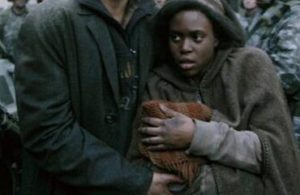Invitation to Vulnerability
“She wrapped him in swaddling clothes and laid him in a manger, because there was no room for them in the inn.” (Lk 2:7)
Our chaplain never tires of reminding us of the uncomfortable and unsanitary conditions under which the Holy Family found themselves on the night Christ was born. The gospel tells of a dangerous journey made under compulsion of political powers, made under conditions of physical vulnerability, with a lack of bare necessities. There was nowhere to lay one’s head, never mind a newborn infant.
 I am reminded of a scene from the film Children of Men, which tells of a future world in which global infertility has broken the nerve of humanity, society is disintegrating, xenophobia runs rampant, and all is violence, self-destruction, and decay. Theo is charged with smuggling a young African woman who is pregnant out of the country, by way of a refugee camp. The camp is a place of brutality and misery, and under the worst imaginable circumstances, the birth is suddenly imminent. There is danger on every side, a decaying building rocked by gunfire and the explosion of petrol bombs, a room with a cement floor containing only a soiled mattress. Theo removes his coat, so that the inside of it may provide some semblance of a clean place for the woman to bear her child. At the sound of the baby’s cry, gunfire ceases and the combatants stand in stunned silence, watching the “family” as they pass by.
I am reminded of a scene from the film Children of Men, which tells of a future world in which global infertility has broken the nerve of humanity, society is disintegrating, xenophobia runs rampant, and all is violence, self-destruction, and decay. Theo is charged with smuggling a young African woman who is pregnant out of the country, by way of a refugee camp. The camp is a place of brutality and misery, and under the worst imaginable circumstances, the birth is suddenly imminent. There is danger on every side, a decaying building rocked by gunfire and the explosion of petrol bombs, a room with a cement floor containing only a soiled mattress. Theo removes his coat, so that the inside of it may provide some semblance of a clean place for the woman to bear her child. At the sound of the baby’s cry, gunfire ceases and the combatants stand in stunned silence, watching the “family” as they pass by.
Is there a purpose in such meditations? In wiping away the sentimental haze of Christmas cards and carols and putting ourselves face to face with a scene that disturbs us? I have the sense that few things horrify the affluent modern American more than unsanitary conditions. But perhaps the deeper horror that gets us is really poverty, helplessness, and vulnerability.
What then is the meaning of our carols and crèches? The earth-shattering revelation of God’s vulnerability. Christmas celebrates the God who chose to be born in unsanitary conditions, in danger and in want, in absolute vulnerability.
Who would choose to be poor, to be in want, to be unsafe and unclean, helpless and vulnerable? God. And why? Because love bade him draw near to his creatures in solidarity. In that impromptu shelter was born love and hope and trust – all that was lacking in a world that had lost its ability to bear children, to bring to birth new life.
Human solidarity can only flow from this birth of hope in the human heart. Solidarity is what we call that attempt by those of us who have always lived comfortably to connect ourselves – intellectually, emotionally and spiritually – with those whose circumstances of terror and deprivation are scarcely imaginable to us. We can fool ourselves that we know, that we understand, that we touch these people in their suffering. What do we know? Only that we abhor vulnerability and run from it.
Some people have no choice but to be vulnerable: the child in the womb, those with mental and physical disabilities, the aged and infirm, the refugee, the homeless, the mentally ill. All too often, these are exactly the people whom we would like to avoid, to put out of our mind. Why? Because their vulnerability makes us smart. Something deep inside us starts to sting and throb cry out in anguish, so we get out of there as quickly as possible. Yet God is with them. God draws near to them. God chose solidarity through absolute vulnerability.
What does this have to say to us? Are we to choose absolute vulnerability, to strip ourselves completely, to expose ourselves to poverty, helplessness, and desperation, so as to find God? Is this what solidarity means?
There are times in life, though they are not frequent, when we are called to make a leap into the unknown, a leap that cost us everything we know, and that places us in as great a vulnerability as we can sustain….